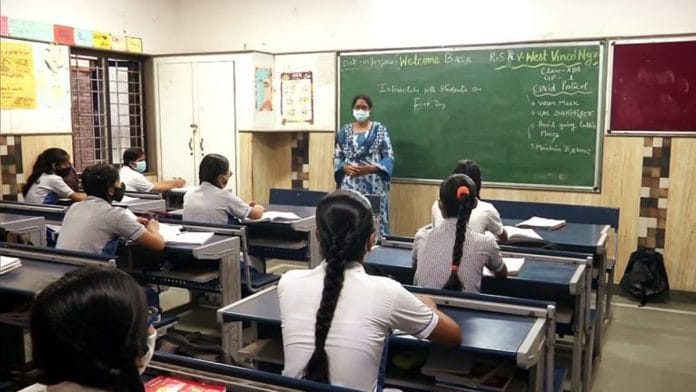New Delhi: Teachers feel the way students are taught and assessed in schools will need to be changed in post-Covid times, according to a study by Azim Premji University.
The study, titled ‘Open Schools, Focus on Recovering Lost Learning: Clear Voice of Teachers’, is based on responses of 363 primary school teachers across five states — Chhattisgarh, Karnataka, Madhya Pradesh, Rajasthan, and Uttarakhand. It was conducted in August, and the findings were released Wednesday. It was aimed at finding ways to integrate students back into the classroom as schools start opening across states. So far, states and UTs like Delhi, Punjab, Andhra Pradesh, Himachal Pradesh, Uttar Pradesh, Uttarakhand, and Haryana have reopened schools.
According to the study, “an overwhelming 96 per cent of the teachers were cognizant of the need to assess children on abilities from the previous years (2019-20 and 2020-21) when schools reopen, rather than just focus on abilities of the current academic year (2021-22)”.
“Teachers recognise that this assessment must form the basis for planning learning with the intent of helping students recover learning loss and bring them up to class-level expectations. Regular, ongoing assessment will be required to keep track of their learning,” the study added.
It also touched upon the need to tailor the curriculum and methodology of teaching, keeping in mind the fact that children have not had proper learning for nearly a year.
“Even teachers who have interacted with students through different modes during school closure feel that the curriculum of the academic year 2020-21 has not been sufficiently covered,” the study stated.
Also read: School lockdowns in India have robbed a generation of upward mobility
Addressing ‘loss of learning’
The teachers, according to the study, felt that there has been a loss of previous learning, which includes foundational abilities such as describing a picture, reading with understanding, writing simple sentences based on a picture, and the ability to perform basic mathematical operations.
As mentioned above, 96 per cent of teachers favoured changes in the curriculum to be able to deal with the reality of the loss of learning.
“The need to focus on foundational literacy and numeracy in the daily timetable was emphasised by 61 per cent of the teachers. Around 74 per cent of the teachers favoured a reduction in the curricular load and the need to map foundational abilities onto the curriculum so as to focus only on such abilities that they recognised to have been most affected,” the study stated.
Also read: 37% students in rural areas not studying at all as schools remain shut, survey finds
Catering to diverse learning levels
Around 57 per cent of the teachers endorsed pedagogical changes to cater to the diversity of learning levels in the classroom. The teachers said that one such approach could be that children work independently or in groups, according to their learning levels, under the overall guidance of the teacher.
The importance of teaching learning material rather than class-specific textbooks was also emphasised by around 48 per cent of teachers.
“Teachers felt that workbooks containing worksheets for all classes across primary schools will be very useful since they help children learn in an organized and interesting manner,” the study added. Worksheets typically contain simple exercises that children can do independently, usually accompanied by interesting visuals.
“These worksheets can be ‘graded’, that is, start from basic abilities and progress to higher-order abilities. This is particularly useful with students of different abilities since a common plan can be developed for the entire class, while allowing all students to participate in similar activities. Such an approach would not only enable learning but will also help the teacher assess the progress of each child,” the study stated.
(Edited by Poulomi Banerjee)
Also read: Bring kids back to schools or decades of progress will be reversed, warns medical colleges body






